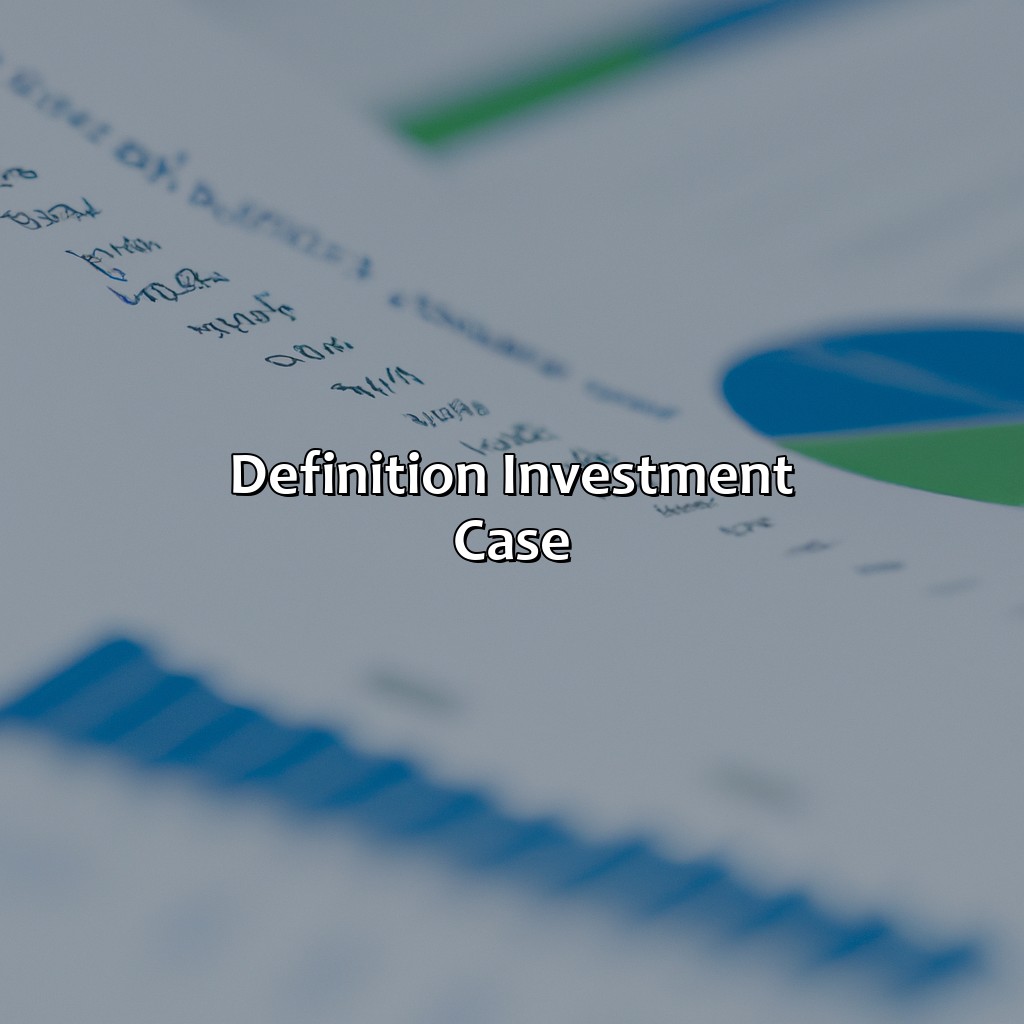What Is An Investment Case?
Key Takeaway:
- An investment case is a document that outlines the rationale for an investment, including the potential benefits and risks of the investment.
- Developing an investment case is important because it helps investors make more informed decisions, communicate the potential of an investment to stakeholders, and evaluate the success of an investment after it has been made.
- To create an investment case, it is important to identify the objective of the investment, analyze the market and competition, estimate the financial potential of the investment, assess the risks, and present the case in a clear and compelling manner.
You need to make an informed decision about your finances, but don’t know where to start? An investment case is the answer. It outlines a strategy to make wise investments and offers practical advice on how to create and manage one. Get ready to make your finances work for you.
Definition: Investment case
An investment case is a proposal that outlines the potential benefits and risks of a specific investment opportunity. It is a comprehensive document that includes financial and non-financial analysis, such as market share, competitor analysis and risk management. The investment case aims to convince stakeholders to invest in the opportunity based on its potential returns. Companies use investment cases to justify capital expenditures and to support strategic decision-making. The document requires extensive research and thorough analysis to provide a clear and well-supported argument for the investment.
A well-crafted investment case must include a detailed analysis of the potential risks and benefits. It should also highlight the unique selling points of the investment and detail how the investment aligns with the overall corporate strategy. A successful investment case requires a strong financial and non-financial analysis, with a focus on the return on investment. A thorough understanding of the market and industry trends is essential to the development of a persuasive investment case.
It is important to note that a well-constructed investment case can increase the likelihood of securing funding from stakeholders. According to a study conducted by McKinsey & Company, companies that rigorously evaluate their capital expenditure through a structured process and with a clear focus on value creation, outperform their peers by 30%.

Image credits: retiregenz.com by Harry Jones
Importance of Investment case
Investment case is a crucial document that outlines the potential benefits of an investment opportunity and the associated risks. It helps investors make informed decisions about whether or not to invest in a particular project. Effective investment cases provide a clear and concise summary of the key factors that affect investment decisions.
Investment cases are important because they provide a framework for evaluating potential investments, identify key risks and opportunities, and provide a roadmap for investors. They also help to communicate the investment opportunity to potential investors, ensuring that everyone understands the nature of the project and the risks and rewards involved.
In addition to the benefits mentioned above, investment cases contain unique details that differentiate them from other investment opportunities. They outline the feasibility of the investment, identifying the potential cash flows and the risks involved. Furthermore, they provide a clear rationale for why the investment is expected to be successful and profitable.
One of the most important aspects of investment cases is the historical context. Throughout history, numerous investments have failed or succeeded based on the strength of the investment case presented to investors. Understanding the historical context of investment cases helps investors to make informed decisions about the potential success of an investment opportunity.

Image credits: retiregenz.com by Joel Duncun
Creating an Investment Case
Analyze the market, estimate financials, and consider possible risks. This will help create an investment case tailored to your objectives. Present a strong case and potential investors may support your goals.

Image credits: retiregenz.com by Yuval Woodhock
Identifying the Objective
When developing an investment case, determining the desired outcome is crucial. This involves identifying objectives that will guide the entire investment process. The investment objective could be geared towards profitability, sustainability, or growth potential, depending on the investor’s preference.
A well-defined objective sets the tone for decision-making and shapes the overall investment portfolio strategy. Knowing what one is trying to achieve and outlining measurable goals makes it easier to track progress and evaluate performance against predetermined benchmarks with accuracy.
Identifying investment objectives is the foundation of creating an effective case. Investors should clearly distinguish between short-term and long-term objectives as well as generalize approaches to align with their requirements. Ambiguity in goals could result in uncalculated risks leading to bad investments decisions.
Investing involves a lot more than making money; investors have different appreciation models for value creation based on their risk capacity preference; identifying these becomes quite essential when creating an investment case. Lack of clarity in desired outcomes exposes investors to excessive volatility and erodes confidence from stakeholders who demand returns.
The importance of defining clear investing goals is reinforced by history’s mistakes, where poor planning leads to heavy losses across various sectors of economies worldwide. Investment managers are better adapting their strategies and building cases around robust objectives that transcend short term events like market fluctuations, guaranteeing sustainable returns for clients over many years.
Why analyze the market when you can just throw darts at a blindly chosen stock and hope for the best?
Analyzing the Market
Market Analysis is the cornerstone of creating an investment case. Before investing, understanding the market is crucial. Analyzing the relevant factors affecting the market, such as competition, demand-supply, trends, and regulations, helps investors determine whether or not to invest their resources in that market.
By collecting and analyzing data on the market size, growth rate, customer segmentation, distribution channels and macro-economic indicators like inflation rates and GDP growth rates; it helps investors understand their risks better. Primary research through surveys or interviews with industry experts can be used to gather insights to support market analysis.
Moreover, identifying key players in the market and assessing their strengths and weaknesses is essential to determine potential investment opportunities within a particular sector.
In addition, examining historical data gives investors an idea of how the market has performed in the past, which can provide insight into its future performance. The right market analysis aids in making informed decisions about investments.
Don’t miss out on potential investment opportunities. Conducting proper analysis will ensure you invest wisely!
Why hire a psychic to estimate your financials when you can just use Excel and hope for the best?
Estimating the Financials
When projecting the Financials for an Investment Case, it is imperative to consider various factors that may impact the outcome. Here’s how you can estimate Financials for your Investment Plan:
| S.No | Expenses | Funding Required | |
|---|---|---|---|
| 1 | Salaries and Wages | $50,000 | |
| 2 | Utilities | $20,000 | |
| 3 | Rent and Office Space | $30,000 | $20,000 |
After estimating the Budget required for the Investment Project, it is crucial to check if it aligns with the expected Returns on Investment (ROI). Additionally, ensure that all potential risks have been taken into account while forecasting.
Pro Tip: Always calculate the Returns on Investment (ROI) beforehand to avoid facing unforeseen losses in an Investment Project. Assessing risk is like online dating, you hope for the best but prepare for the worst.
Risk Assessment
Identifying potential threats that may impact investment returns is critical in creating a successful Investment Case. By conducting a Risk Analysis, investors can evaluate factors such as market volatility, political instability, and economic conditions. Through this analysis, investors can determine the potential return on investment and decide whether it’s worth accepting the level of risk involved.
In Risk Assessment, the focus shifts towards evaluating and quantifying the risks associated with an investment opportunity. Methods such as Monte Carlo simulations and sensitivity analysis allow investors to understand how changes in various risk factors could affect investment outcomes. This allows them to make informed decisions about managing uncertainty and maximizing returns while mitigating risks.
It’s essential to remember that each investment opportunity comes with unique risks that must be assessed and evaluated before committing any capital. By conducting a thorough Risk Analysis and Assessment, investors can approach their investments strategically, maximizing potential returns while minimizing potential losses.
Don’t miss out on valuable opportunities by neglecting proper Risk Assessment procedures. Make informed financial decisions by dedicating time to evaluate potential threats rigorously, ensuring your asset allocation aligns with your risk tolerance levels.
Presenting the Investment Case
Assembling the Case for the Investment Opportunity in a Professional Manner
Presenting the investment case requires assembling key information to persuade potential investors to invest their capital. The case presents an opportunity worthy of monetary investment and covers potential risks, benefits, and returns on investment over time. A well-crafted investment case clearly outlines the viability of an investment and the value it offers, with solid reasoning, analytics, and metrics.
When presenting the proposal to investors, ensure it is concise yet compelling. Use comprehensive data analysis to provide investors with market insights and projections that support your proposition. Form a story around the numbers that will interest and motivate potential investors. The presentation should be able to answer questions as they arise.
Remember to highlight how your unique strategy or approach improves chances of success which other investments may not offer. With attention-grabbing headlines on every slide or pages of pitch deck comprising charts, figures and supporting facts make equity investing much more appealing.
By providing a well-crafted investment opportunity illuminating unique strengths devoid of exaggerated promises, without losing sight of risk mitigation strategies create trust in would be investor. Maintain persistence as no one gets this process right first time round too.
Some Facts About Investment Case:
An investment case is a document that outlines the potential financial benefits and risks of a proposed investment. (Source: Investopedia)
The investment case is used to justify and secure funding for the investment from stakeholders and decision-makers. (Source: Harvard Business Review)
The investment case typically includes information on market trends, financial projections, and risk assessments. (Source: McKinsey & Company)
Developing a strong investment case requires thorough research, analysis, and attention to detail. (Source: Deloitte)
A well-executed investment case can lead to significant returns, increased organizational success, and improved decision-making processes. (Source: CFA Institute)
FAQs about What Is An Investment Case?
What is an investment case?
An investment case is a report or document that outlines the reasons why an investor should consider investing in a particular asset, project, or market. It includes information about the investment’s potential returns, risks, and any other factors that might influence the decision to invest.
What information is typically included in an investment case?
An investment case usually includes information about the investment’s business plan, market analysis, financial performance, risk profile, and management team. It may also include details about the investment structure, exit strategy, and regulatory framework.
Why is an investment case important?
An investment case is important because it helps investors make informed decisions about where to invest their money. It provides a clear and concise summary of the investment opportunity, allowing investors to weigh the potential risks and returns before making a commitment.
Who typically creates an investment case?
An investment case is typically created by the investment’s sponsor or promoter, such as a fund manager, entrepreneur, or developer. It may also be prepared by a financial advisor, investment banker, or other professional who specializes in investment analysis and due diligence.
How is an investment case used?
An investment case is used to persuade potential investors to finance a particular project or asset. It is also used to help investors evaluate the risks and rewards of investing in that opportunity. Additionally, it may be used to satisfy legal or regulatory requirements for disclosing investment information.
Can an investment case guarantee success?
An investment case cannot guarantee success, as all investments carry some degree of risk. However, a well-prepared investment case can help investors make a more informed decision about whether to invest or not, by providing them with all the relevant information necessary to evaluate the investment opportunity.
 Checkout this IRS Loophole
Checkout this IRS Loophole 
